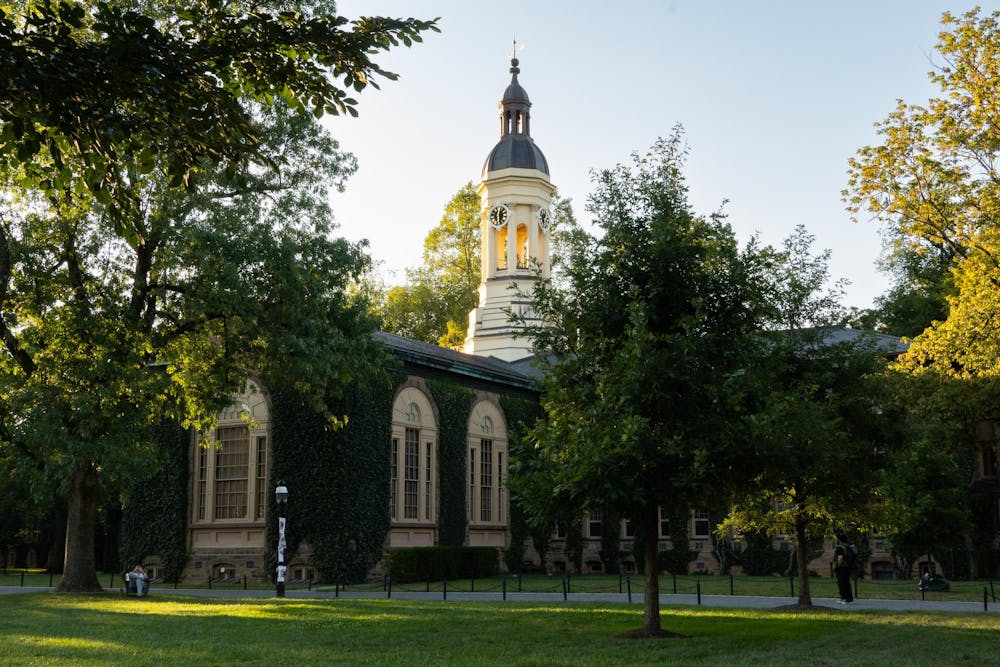Princeton students are preparing to set up their own “Gaza Solidarity Encampment,” according to documents first obtained by the National Review and independently verified by The Daily Princetonian, following high-profile encampments at Columbia University, Yale University, and other college campuses that have resulted in student arrests. No tents have been erected in the Nassau Hall area — a focal point for previous sit-ins on campus — at time of publication. The documents did not specify a timeline for when the encampment might begin.
In a leaked press release, organizers reiterated previous demands for the University to “divest and dissociate with Israel,” as well as a call for broad transparency in the University’s research and investments. University officials have warned undergraduates that participation in an encampment or occupation may result in disciplinary action, including suspension and expulsion.
“We’re not going anywhere until these demands are met,” organizers wrote.
The ‘Prince’ has reached out to multiple students affiliated with University-recognized, pro-Palestinian organizations — they did not respond to request for comment.
According to a leaked document detailing the onboarding processes for students willing to participate, organizers aim for an overnight encampment of at least 20 people.
Vice President for Campus Life W. Rochelle Calhoun wrote in an email sent to undergraduate students at 10:08 a.m. on Wednesday morning that “[a]ny individual involved in an encampment, occupation, or other unlawful disruptive conduct who refuses to stop after a warning will be arrested and immediately barred from campus.” The email was sent approximately two hours after the National Review article was published.
“For students, such exclusion from campus would jeopardize their ability to complete the semester. In addition, members of our community would face a disciplinary process (for students this could lead to suspension, delay of a diploma, or expulsion),” Calhoun wrote.
Calhoun’s email is the first message to the full undergraduate student body threatening potential disciplinary action in response to pro-Palestinian activism, and marks the most explicit proposed action of the University towards student conduct and protest since Oct. 7.
In his most recent State of the University letter in January, University President Christopher Eisgruber ’83 reiterated the administration’s commitment to free speech, even speech that some find offensive. However, Eisgruber also wrote, “that does not mean we must remain silent in the face of it … The mere fact that speech is offensive is never grounds for discipline at Princeton; the speech must fall under one of the enumerated exceptions to our free expression policy, such as those permitting the University to restrict threats or harassment.”
The proposed encampment is also the first major escalation of pro-Palestinian activism on Princeton’s campus beyond a die-in in Firestone Plaza in February.
“I am concerned that what the University administration is doing here is modifying the University Rights, Rules & Responsibilities to … specifically target potential Princeton student action in line with, or in a similar fashion to, encampments that have been set up at other universities around the country,” professor Max Weiss told The Daily Princetonian in an interview.
Weiss is an associate professor of history and member of Faculty for Justice in Palestine (FJP), which published an open letter in support of the “Gaza Solidarity Encampment” at Columbia University on Monday. Weiss noted he was not speaking on behalf of FJP.

“The intention represents an instance of prior restraint — in other words, a move to chill student activism and free expression, even as they continue to use the language of free speech,” Weiss added.
“Because the University is committed to free and open inquiry in all matters, it guarantees all members of the University community the broadest possible latitude to speak, write, listen, challenge, and learn,” the University’s Free Expression statement in Rights, Rules, and Responsibilities reads.
Calhoun, in her email to students, noted that this “guarantee extends to protests and demonstrations, provided they do not involve genuine threats, harassment, or conduct that impedes the right of others to be heard, violates the law, or disrupts essential operations.”
In the past two weeks, dozens of students at Columbia and Yale have been arrested for refusing to leave their respective encampments. At Columbia and Barnard College, all students identified as being involved with their encampment were suspended, and some students reported being barred from their campus housing.
The National Review article, written by Abigail Anthony ’23, included a spreadsheet of names and emails of professors to be contacted for support for the encampment. A number of the faculty included were signatories on the Monday letter from FJP, which said they would boycott Columbia and Barnard until their demands to reinstate suspended and arrested students are met.
The plans for an encampment were first posted online on Tuesday night by Solveig Gold ’17, who shared the onboarding document on X.
Nassau Hall last saw a major sit-in action in 2019, when protestors with Princeton Students for Title IX Reform (PIXR) spent more than 200 consecutive hours outside the building to demand reforms on University sexual misconduct policy. In 2015, members of the Black Justice League hosted a sit-in inside Eisgruber’s office for 33 hours to call on the University to address institutional racism.
This story is breaking and will be updated as further information becomes available.
Miriam Waldvogel is an associate News editor and the investigations editor for the ‘Prince.’ She is from Stockton, Calif. and often covers campus activism and University accountability.
Please send any corrections to corrections[at]dailyprincetonian.com.
Editor’s note: the ‘Prince’ has independently verified the documents obtained by the National Review.’








